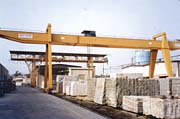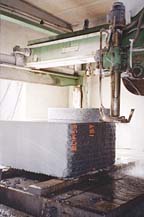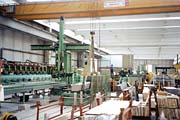

Marmi Verona was originally founded in 1963, and during the first 15 years of its existence, it fabricated architectural works for the local market in Verona. It then moved into tile production, and it reports that it was the first company in the Verona area to manufacture and supply thin floor tiles in granite with thicknesses of 10 and 12 mm, which were ready to be installed on pre-existing floors.
The process for fabricating tiles at Marmi Verona begins with blocks, which are processed on one of six blockcutters. The newest blockcutter, which is from Pedrini, is one of the most advanced models, and it operates with the most precision.
A total of 10 employees are on hand working a single shift, but the blockcutters can be in operation 24 hours per day. The cost for power in the Verona area is less expensive during the nighttime hours, and the company actually purchases the necessary kilowatt-hours to run the equipment in advance. Typically, a computer network controls the machinery so that it shuts down during peak times when the power would cost the most.
Once the blocks are cut into "billets" (stone strips), they are processed into tiles on one of three processing lines. For standard tile sizes such as 12 x 12, 12 x 24 and 16 x 16 inches, the company has a Pedrini tile line that includes a total of 20 polishing heads. This line is equipped with abrasives from Tenax S.p.A., an Italian firm. Marmi Verona is using a complete sequence of Tenax abrasives, including diamond calibrators, diamond metal abrasives, diamond fine grain abrasives, regular abrasives and buffers.

Even with automation in the plant, however, quality control is a key issue for Marmi Verona, and the tiles coming from the line are carefully monitored by company personnel.
A second tile line is used for customized tiles that are not part of the company's standard product lineup. In addition to tiles, the company offers slabs that are 2 and 3 cm thick as well as skirting, listellos and inserts. For cut-to-size work, the company has bridge saws from Noat, an Italian firm.
When running at full capacity, Marmi Verona can produce up to 1,500 square meters of tile per day. Among the specialized tile products are thin tiles measuring 3 or 4 mm thick. These tiles are reinforced with a special resin from Tenax, S.p.A. as well as fiberglass honeycomb backing.
In another project, Marmi Verona is also working on large-format stone tiles that features edges made from wood, which provide a unique aesthetic for countertops or corners. These panels could measure 60 cm in length, so they could be installed by one person, and they feature a depth of two feet, making them an option for kitchen countertops. Marmi Verona is currently working with Tenax S.p.A. to formulate the proper adhesive for this unique application, although the product is still in the testing and market research stages.
The company's main market is the stone traders in Italy, which then sell the tiles to markets such as Austria, Germany and Switzerland in Europe and in Japan, the U.S. and Australia overseas. According to the company, certain stones are very specific to the tastes of certain countries. And as a result, Marmi Verona looks to keep a large range of colors in stone, up to 100 at one time, including unique and hard-to-find materials. Overall, the company maintains an inventory of over 40,000 square meters of material in stock.
In addition to keeping a range of colors, Marmi Verona also concentrates on providing a variety of different finishes, including honed, sandblasted and an anti-slip laser finish.